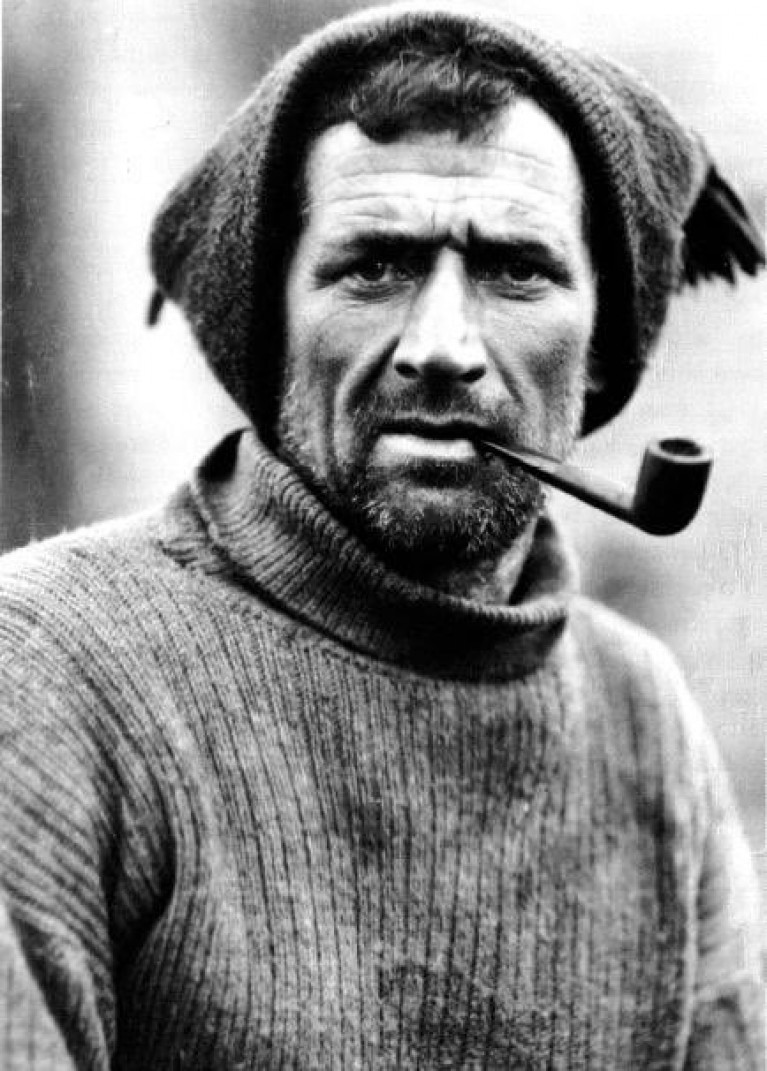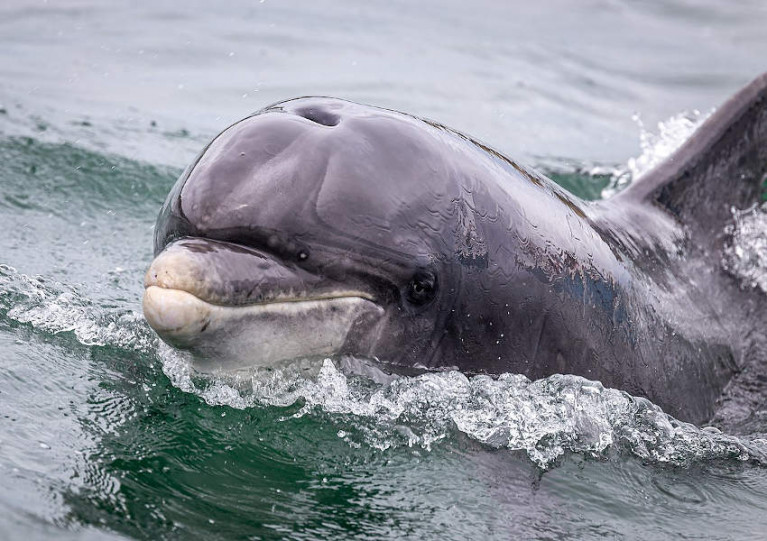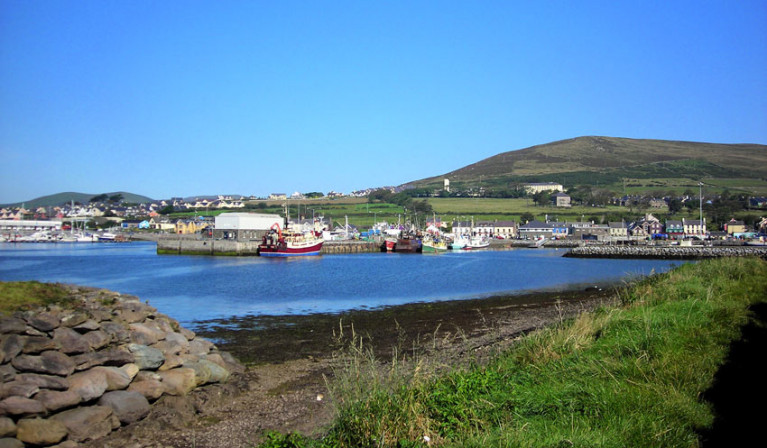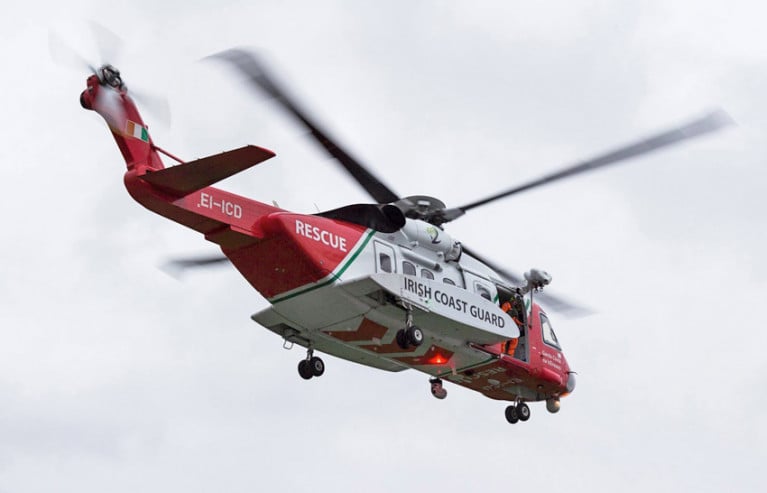Displaying items by tag: Dingle
Fungi and Armada Shipwrecks Focus of Virtual Experience in Dingle, Co Kerry
The owners of a former Dingle fish processing plant have received Brexit-related grant aid towards a 1.3 million euro visitor attraction, which recalls the harbour’s famous dolphin, Fungi.
The Keane family, owners of Ó Catháin Iasc Teo, have invested over €1,355,000 in the project, of which more than €177,000 was grant-aided under the Brexit Blue Economy Enterprise Development Scheme.
The Wild Atlantic Virtual Experience (WAVE), as it is called, offers visitors an “immersive ocean experience”, telling the story of marine life through the eyes of the men and women who have fished off the Co Kerry shores for thousands of years.
 The project is using what is described as Ireland’s “largest 360-degree LED screen” which includes screening of life size computer-generated images of Fungi Photo: Dominick Walsh
The project is using what is described as Ireland’s “largest 360-degree LED screen” which includes screening of life size computer-generated images of Fungi Photo: Dominick Walsh
The project is using what is described as Ireland’s “largest 360-degree LED screen” which includes screening of life size computer-generated images of Fungi.
“The experience also explores shipwrecks and uncovers the myths and legends of the sea, bringing visitors up close to majestic humpback and orca whales, seals, turtles, and other sea life,” BIM says.
It includes a virtual trip through a sunken Spanish Armada ship and German U-boats.
Michael Keane says that “climate change” has hurt the Ó Catháin fisheries business substantially in recent years.
“We were primarily a herring factory, but they have migrated further north due to climate change,”he says.
“There’s almost no stock of herring down here now. We used to work for eight months of the year, now it’s six weeks,” he said.
“We had to do something to stay in business and we knew the fish business and the culture, so we eventually hit on the idea of developing Wave in the 17,000 sq ft building in which we had our fish processing operations,”he said.
“Without the support of the Brexit Blue Economy Enterprise Development Scheme and BIM, we would not have been in a position to make this investment. Since we opened, the reaction has been great,” he said.
“ We will keep developing the experience, and aim to create an iconic international and local market attraction that highlights the best of the Dingle Peninsula, accessible all year, and further enhancing Dingle as a year round destination,”he added.
WAVE can accommodate over 200 tourists per hour and is laid out in five separate rooms, each with its own experience. It aims for 70,000 visitors annually and 16 full-time employees over five years.
The project aims to be carbon neutral by 2028.
“We have installed energy efficiency lights and solar panels,”Keane says.
“There is also a cafe with sustainable packaging and offering locally supplied produce. The building has been designed to easily add further initiatives over the coming years,” he says.
Kerry Councillor Reiterates Call for Research Vessel RV Tom Crean to be Named in the County
A Kerry county councillor says it's appropriate that a vessel to be named after Kerry's Antarctic explorer would officially take place in the county.
The Marine Institute has commissioned a new research vessel, which is to be named the RV Tom Crean in honour of the explorer.
In 1893 at the age of 16, Tom Crean departed Minard in Lispole and joined the Royal Navy.
In the early 1900s, he was part of three British expeditions which had hoped to be the first to reach the South Pole.
He received an Albert Medal for his lifesaving efforts during the final expedition.
Last year, the Marine Institute commissioned a research vessel, which they intend to name the RV Tom Crean as revealed by Afloat back in January.
For more on the councillor's call, click onto Radio Kerry's coverage in addition the last update on the newbuild's progress.
Dingle Hosting Day to Remember Fungie’s Legacy One Year On from Dolphin’s Disappearance
Dingle will host a special commemoration for Fungie the dolphin this month, as the Irish Independent reports.
Fungie took up residence in the Co Kerry harbour in 1983 and over the decades since formed the backbone of the town’s tourism-based economy.
But the bottlenose dolphin disappeared in mid October last year — and marine experts suggest he either died or relocated to waters where he’s yet to be traced.
One year on and a special commemoration day is planned in Dingle on Sunday 17 October to celebrate the dolphin who put the town on the map.
Free boat trips around the harbour entrance will be offered, with donations welcome to support Dingle Coast and Rescue and Mallow Search and Rescue.
“We want to celebrate the magic that Fungie brought to Dingle and to people from all over the world,” said local resident Jamie Flannery.
The Irish Independent has much more on the story HERE.
Dingle for the America's Cup?
It was discussed in the Seanad on Wednesday the fifth of March in 2003…..
Senator Joe O'Toole, a teacher by profession was an Independent Senator, served as General Secretary of the National Teachers Organisation and President of the Congress of Trade Unions… and came from Dingle...
So, he suggested to another Kerryman, then Sports Minister John O'Donogue, that Dingle would be a good base for the Cup to be sailed… It had just been concluded in Auckland, won by Switzerland… It would bring a billion to the west…. marinas in Cahirciveen, Fenit and Kilrush and, of course, Dingle, Would support it, he said.
The America's Cup didn't come to Dingle … The Minister for Sport at the time wasn't rushing to secure it, as I remember covering that story for RTE….
Now I'm tired of being asked to support various campaigns underway to get the AC for Cork and tired too of being described as a "begrudger" when I raise questions about it and also tired of being called "elitist" when defending sailing.
I believe in sailing as a "sport for all" ….. I don't like sailing being described as "elitist" and that is increasing – arising from the AC proposal.
Supporters of the 'AC for Cork' haven't acknowledged 2024 also as an Olympics Year in Paris…. Should the America's Cup, in which no Irish team is likely to be taking part because it couldn't be afforded, get many millions of taxpayer-funded Euros when there is still not enough State support for Irish sailors taking part in the Olympics?
Which would be of more benefit to the sport?
Pointing to the Round the World Race in Galway overlooks that, while big crowds attended the 'festival' around the event --- and there was an Irish boat involved…. it left unpaid bills behind for a while and that caused some resentment ….
 Ireland's brigantine Asgard II at the Australian 200th celebrations
Ireland's brigantine Asgard II at the Australian 200th celebrations
So, what about the photo of Asgard printed here, which in the past week appeared on social media, posted by the well-known, renowned Gerry Burns…
Asgard at the Australian 200th celebrations – "a great ambassador for Ireland" – the value of teaching hundreds of young people from all sectors of life the wide value of sailing ….and never given enough dedicated State support by the Department of Defence whose responsibility it was and with a Minister, Willie O'Dea, who wouldn't give the insurance compensation money for its sinking to replace it….
If there are millions available for a maritime event, why wouldn't it be put into leisure maritime development around the Irish coast?
The Tall Ships Races brought crowds and economic benefits to Cork, Dublin and Waterford, where there were three Irish tall ships taking part… now we have none actively sailing… so much for the continued support of sailing…
The AC has become a big commercial business, where money dictates more than sailing….. where the attempt seems to be to bulldoze Ireland into taking on a massive cost in a short timeframe … and helping to pay for the New Zealand defence which, if Team New Zealand can't find a location, could end up in another AC legal wrangle…
 The America's Cup has become a big commercial business
The America's Cup has become a big commercial business
If there are millions available for a maritime event, why wouldn't it be put into leisure maritime development around the Irish coast – more public marine leisure facilities, marinas, which might bring many more visitors, more regularly or club development to encourage more public involvement and rid sailing of that 'elitist' tag…..
When the government of the leading sailing nation in the world won't give the AC organisation in its own country the amount of money they want to hold the event in Auckland, I wonder who may end up being mugs for the elite of the AC?
Marine Minister Hails ‘Constructive Meetings’ on Visits to Fishing Ports in Co Kerry
Marine Minister Charlie McConalogue has continued his series of visits to some of Ireland’s main fishing ports, spending yesterday and today (Thursday 16 and Friday 17 September) in Co Kerry.
The minister met with fishers, fishing organisations and other stakeholders as he visited the ports of Dingle, Fenit and Cromane.
These visits follow on from the minister’s trips during the summer to Howth, Kilmore Quay, Dunmore East, Killybegs, Union Hall and Castletownbere.
In Fenit, the minister met with local fishers to discuss fishing matters. The Marine Institute and local stakeholders updated on conservation initiatives and measures for crayfish along the Co Kerry coastline and outlined protection measures for angel shark, skates and rays, particularly in the Tralee Bay area.
A public consultation on the crayfish fishery was launched last month to gather views on measures targeted at eliminating the by-catch of endangered species while seeking to secure a viable and sustainable future for the fishery. The consultation concluded yesterday.
Later the minister visited Dingle Fishery Harbour Centre and met the harbour master. Since 2010, €17.4 million has been invested in the development and maintenance of Dingle FHC under the Department of Agriculture, Food and the Marine’s Fishery Harbour and Coastal Infrastructure Capital Programme.
In Dingle, the minister also met with local fishers and representatives of the seafood and broader marine sector including the Dingle Innovation Hub and the Dingle Aquarium.
In Cromane, the minster met with, and heard the views of the local community regarding a landing facility.
Commenting on the visits, Minister McConalogue said: “I have had constructive meetings with fishers, aquaculture farmers and other stakeholders during my visit to Kerry today, and I thank everyone for meeting me to discuss matters important to their communities.
“It is a great opportunity for me to hear directly from marine stakeholders who are central in ensuring the long-term vibrancy of our coastal communities.”
Valentia RNLI volunteers launched their all-weather lifeboat yesterday (Saturday 17 July) to assist an 11-metre yacht with two people onboard, which required assistance.
At 4.46 pm the Valentia Coast Guard requested Valentia RNLI’s volunteer crew to launch the all-weather lifeboat to assess the situation of an 11-metre yacht with machinery failure. The yacht with two people onboard was 3 miles southwest of Dingle Harbour. Weather conditions at the time we described as good visibility, one metre swell with a gentle breeze force three south-westerly wind.
At the location, the RNLI crew came alongside the vessel to assess the situation and ensure all occupants onboard were safe. Our Coxswain made the decision that undertaking a tow was necessary and the safest way to assist the casualties. The towed vessel was returned to the nearest and safe and suitable port at Dingle Marina.
Dingle’s boatmen have been hit hard by the double whammy of pandemic restrictions on the tourism trade and the disappearance of Fungie last autumn.
But as the Business Post reports, the boatmen of the Kerry Gaeltacht town have directed their ire at the Government for what they believe is a failure to support their industry — such as the absence of a freeze on harbour fees.
Dingle Sea Safari owner Jimmy Flannery says: “It looks like, once again, when it comes to the marine sector, they don’t give a damn.”
The Business Post has much more on the story HERE.
A video circulating online of a dolphin frolicking in Galway Bay is “extremely unlikely” to be the missing bottlenose Fungie, as the Irish Examiner reports.
The footage sparked hopes that Dingle’s famous long-term marine wildlife resident had reappeared nearly five months after his last sighting in the Co Kerry town.
But Nic Slocum of Whale Watch West Cork said that while it was impossible to be “absolutely sure”, there were enough indications that it was not the same animal as Fungie, with a smaller body and shorter beak.
“They both jump, and they both jump in that way. And I know everybody got a little bit excited because they thought it might be Fungie showing himself again,” Slocum said.
“From my perspective, I would say that it is extremely unlikely to be Fungie and far more likely to be a short beak common dolphin.”
The Irish Examiner has more on the store HERE.
Dingle Peninsula ‘At a Crossroads’ as Tourism Fails to Bring Benefits, Report Warns
Efforts to drive tourism in the Dingle Peninsula may be doing more harm than good, according to a newly published report.
As the Irish Independent reports, the Fáilte Ireland Visitor Experience Development Plan — which was completed before the disappearance of Fungie the dolphin, a major draw for Dingle — suggests that despite “huge” traffic volumes in the region, they result in little spend.
It highlights that Dingle town itself has been the focus of tourism investment at the expense of other communities on the Co Kerry peninsula — and that previous decision-makers had failed to capitalise on the potential for wider heritage and cultural tourism.
Moreover, it warns that the sheer numbers of people passing through in coaches and private vehicles are putting significant pressure on the local environment.
The plan says: “The potential socio-economic benefits of tourism are not currently being realised and it is widely regarded that tourism on the Dingle Peninsula is at a crossroads.”
The Irish Independent has more on the story HERE.
Teenage Boy Dies in Fall from Co Kerry Coastal Cliff
A teenage boy has died in a tragic accident after a fall from a coastal cliff on the Dingle Peninsula, as RTÉ News reports.
It’s understood that the 17-year-old slipped and fell while out walking with his family at Cinn Aird, east of Dingle, this afternoon (Sunday 3 January).
A multiagency emergency response was launched, and the crew of the Shannon-based Irish Coast Guard helicopter Rescue 115 located the teenager at the foot of the cliffs.
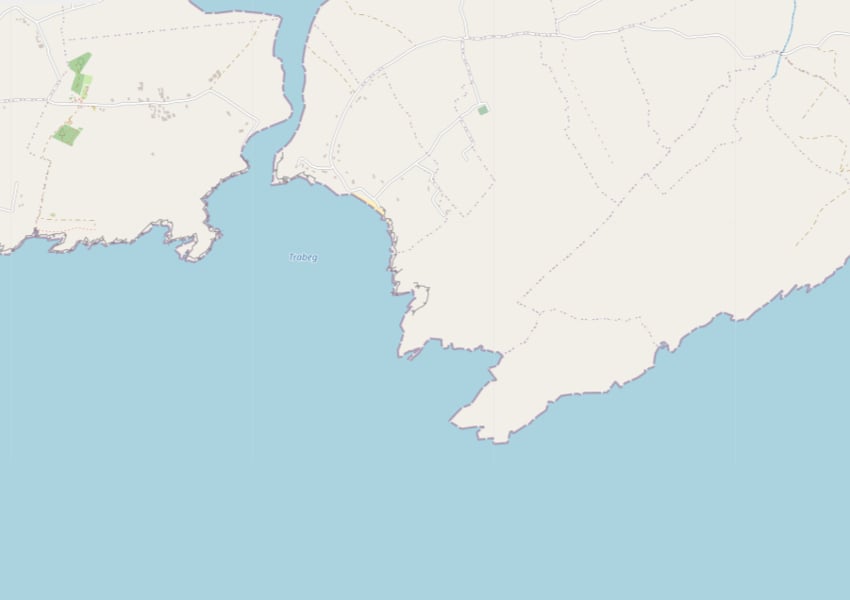 Cinn Aird, east of Dingle in Co Kerry | OpenStreetMap
Cinn Aird, east of Dingle in Co Kerry | OpenStreetMap
The body was subsequently recovered by Valentia RNLI and transferred to University Hospital Kerry in Tralee for post-mortem.
In a statement on social media, the lifeboat crew said: “The thoughts of everyone at Valentia RNLI are with the family at this sad time.”



























